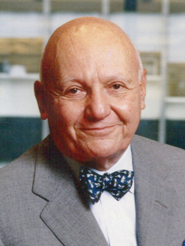Twenty years ago, a book titled “The Super Traders” set out to capture the “secrets and successes of Wall Street’s best and brightest” minds. Then, there were three national markets and 407.3 million shares traded a day. In today’s Part VI of the April cover story is the perspective of the last Super Trader and his take on how trading has changed.
Here are the thoughts of the last interviewed Super Trader, Alan Greenberg.
The Chairman
Alan C. Greenberg

Then: Chairman, executive committee, the Bear Stearns Companies
Greenberg rose through the ranks of Bear Stearns to serve as its chief executive from 1978 to 1993 and chairman of the board from 1985 to 2001. Bear Stearns was acquired by J.P. Morgan Chase in March 2008, the first signal event of the financial crisis that erupted that year.
Now: Vice chairman emeritus, J.P. Morgan
I believe one of the most significant changes over the past 20 years has been the huge amount of volume traded away from the New York Stock Exchange. We have also seen the dramatic increase in high-volume trading, which I don’t believe is a negative at all. In fact, I think trading markets are remarkably good right now. Believe me-I don’t see the negatives. The liquidity available today allows me to buy or sell a big block of stock within 3 cents of the last sale, and I can get in and out of positions with unbelievable ease. It is amazing, and I consider this a major change to the markets.
If somebody wants to buy a stock on Monday and sell it on Thursday, they are going to go broke anyway. High-volume trading is not going to help them. You can’t make a living doing that; maybe one person in 1,000 will be successful. But for an investor who holds a stock for three or six months, the ability to buy it at a good price and be able to sell the position close to last sale-tell me, how does the system hurt them? People who see a danger in this frankly don’t know what they are talking about.
We have also seen the complete disappearance of investment banks. Bear itself, Merrill Lynch and others have been taken over by commercial banks such as J.P. Morgan, Bank of America and Citibank. Even Morgan Stanley and Goldman Sachs are now commercial banks and highly regulated.
I was always looking for PSDs to recruit for Bear Stearns-young men and women who were Poor, Smart and had a Desire to make money. But today, the pool of young talent has narrowed along with the job opportunities, and they tend to all come from a handful of colleges. And this is a shame. After six months working at Bear Stearns, I had no idea whether an employee was Ivy League or not-they were either smart or dumb. Unfortunately, there are just fewer opportunities because there are not as many firms out there these days.



